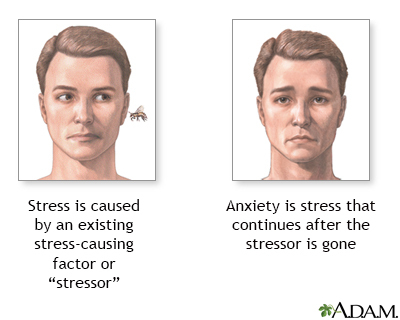What To Know About Mental Health: Everyone’s Doing The Best They Can
Michael Shapiro, M.D., an assistant professor in the UF College of Medicine’s department of psychiatry and medical director of UF Health Child Psychiatry and…

Update your location to show providers, locations, and services closest to you.
Stress is a feeling of emotional or physical tension. It can come from any event or thought that makes you feel frustrated, angry, or nervous.
Stress is your body's reaction to a challenge or demand. In short bursts, stress can be positive, such as when it helps you avoid danger or meet a deadline. But when stress lasts for a long time, it may harm your health.

Anxiety; Feeling uptight; Stress; Tension; Jitters; Apprehension
Stress is a normal feeling. There are two main types of stress:
STRESS AND YOUR BODY
Your body reacts to stress by releasing hormones. These hormones make your brain more alert, cause your muscles to tense, and increase your pulse. In the short term, these reactions are good because they can help you handle the situation causing stress. This is your body's way of protecting itself.
When you have chronic stress, your body stays alert, even though there is no danger. Over time, this puts you at risk for health problems, including:
If you already have a health condition, chronic stress can make it worse.
SIGNS OF TOO MUCH STRESS
Stress can cause many types of physical and emotional symptoms. Sometimes, you may not realize these symptoms are caused by stress. Here are some signs that stress may be affecting you:
The causes of stress are different for each person. You can have stress from good challenges as well as bad ones. Some common sources of stress include:

Call your health care provider if you feel overwhelmed by stress, or if it is affecting your health. Also call your provider if you notice new or unusual symptoms.
Reasons you may want to seek help are:
Your provider may refer you to a mental health care provider. You can talk to this professional about your feelings, what seems to make your stress better or worse, and why you think you are having this problem. You may also work on developing ways to reduce stress in your life.
If you or someone you know is thinking about suicide, call or text 988 or chat 988lifeline.org. You can also call 1-800-273-8255 (1-800-273-TALK). The 988 Suicide and Crisis Lifeline provides free and confidential support 24/7, anytime day or night.
You can also call 911 or the local emergency number or go to the hospital emergency room. DO NOT delay.
If someone you know has attempted suicide, call 911 or the local emergency number right away. DO NOT leave the person alone, even after you have called for help.


Ahmed SM, Hershberger PJ, Lemkau JP. Psychosocial influences on health. In: Rakel RE, Rakel DP, eds. Textbook of Family Medicine. 9th ed. Philadelphia, PA: Elsevier; 2016:chap 3.
National Institute of Mental Health website. I'm so stressed out! fact sheet. www.nimh.nih.gov/health/publications/so-stressed-out-fact-sheet. Accessed August 17, 2022.
Freedland KE, Carney RM, Lenze EJ, Rich MW. Psychiatric and psychosocial aspects of cardiovascular disease. In: Libby P, Bonow RO, Mann DL, Tomaselli GF, Bhatt DL, Solomon SD, eds. Braunwald's Heart Disease: A Textbook of Cardiovascular Medicine. 12th ed. Philadelphia, PA: Elsevier; 2022:chap 99.


Michael Shapiro, M.D., an assistant professor in the UF College of Medicine’s department of psychiatry and medical director of UF Health Child Psychiatry and…

It’s a new year, and for many, that means new goals. Each year, millions of Americans make New Year’s resolutions that they forget or fail to keep up by…